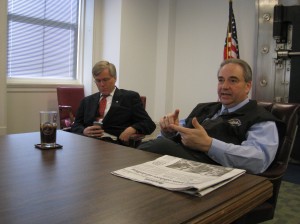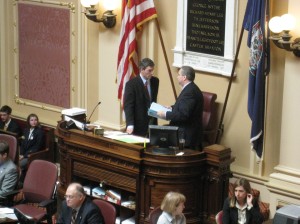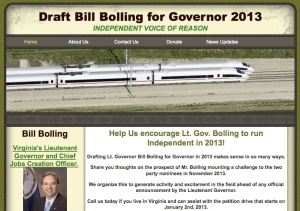Recently, some Republican leaders and pundits in Virginia have been floating the idea of changing the way the state awards its electoral votes in presidential elections. Currently, Virginia gives all 13 of its votes to the candidate who receives a plurality of the statewide popular vote. In both 2008 and 2012, Democrat Barack Obama claimed Virginia, the first Democratic candidate to do so since Lyndon Johnson did in 1964. This new plan, sponsored by State Senator Charles Carrico Sr. of Grayson County, gives the winner of each of the state’s 11 congressional districts one vote, with the remaining two votes going to the candidate who wins the most districts.

From nationalatlas.gov
There is no doubt that this proposed change would radically modify the outcome in Virginia. Taking 2012 as an example, Barack Obama only won 4 of the 11 of the congressional districts, with the remaining 7 going to Republican Mitt Romney. If Carrico’s plan had been in place, Romney would have ended up with 9 of Virginia’s electoral votes has opposed to the zero he actually received. The fact that Obama won 50.8% of the statewide vote would have been completely irrelevant.
Although there is some argument to be made that both the interest and will of Virginia’s voters would be better served under some other plan than winner-take-all, the Carrico solution is a particularly terrible suggestion.
The fundamental reason why this plan is poor deals with the ugly issue of gerrymandering. According to the Constitution, each congressional district must be roughly equal in population. Based upon the population of the Commonwealth, Virginia has 11 districts. However, the question becomes, how should the state be divided into these 11 pieces?
Given that the Virginia legislature draws these districts, they are often created, not based upon regional hegemony, but for political gain. For example, we know that, in general, the most heavily Democratic areas of the state are areas of fairly close population density, such as most of northern Virginia, and cities like Charlottesville, Richmond, Williamsburg, and Norfolk. Creating a district that included a majority of Arlington or Alexandria would almost certainly result in a Democratic heavy district, while crafted a district using the counties of Augusta and Rockingham in the Shenandoah Valley, or Powhatan and Hanover in central Virginia would have the opposite effect.
With these thoughts, and previous voting history in mind, one can combine like-minded areas to generate safe districts, much like the 3rd & 8th congressional are for the Democrats, or 9th & 6th are for the Republicans. It is also possible to dilute the vote, such as splitting the heavily Democratic city of Richmond between the 3rd and the 7th or to enhance the effects of a voting population as is done in the Virginia House of Delegates where four different Republican members of that body benefit from representing a portion of the Republican voting strength of Rockingham County. Simply add a city or subtract a county, and one can often safely assume a result long before voters head to the polls. Offer any politically savvy consultant a pen, a map, and a few statistics; with these tools he or she can draw lines that can easily serve the interests of either the Republican or Democratic Parties.
Now some people might say that given the fact that the Republican Party controls the state government, rank and file Republicans should not speak ill against this proposal, given that if it passes it will likely benefit the party. However, such a view is shortsighted and ignores the political health of the nation. Sure, Republicans are in charge today and this move could bolster the Republican presidential candidate’s chances in 2016, but what happens when the Democratic Party regains control? Would it be just for the GOP to speak out against a plan that they created when it no longer serves their political interests in the future?
Another factor to consider is the issue of political relevancy. For example, in 2008, Barack Obama gave a speech in Harrisonburg in order to gain support among the residents of the city and the student body of James Madison University. This move proved successful as he ended up winning this city. However, if the 6th district voted as a solid block, then he would have had no incentive to go to Harrisonburg, for it would have been impossible for him to make any difference. Even if every citizen in Harrisonburg voted for Obama, those totals would have been insufficient to overcome the Republican heavy 6th district.
The same logic would hold true for Republican candidates as well. If the 6th were seen as a solid block, it would be foolish to waste time and resources in an area where victory was a certainty. Thus, under the Carrico system, no presidential candidate would set foot in the 6th district ever again, all parties would largely ignore the region, and it is almost certain that political apathy and/or intolerance would become the norm throughout both the conservative and liberal segments of the Shenandoah Valley.
Therefore, for the twin concerns of gerrymandering and maintaining political relevancy, legislators, activists, and ordinary citizens throughout Virginia ought to oppose Senator’s Carrico’s plan to award the state’s electoral votes based upon the winners of each congressional district. Yes, it sounds quite tempting to many Republicans today, but the lasting consequences of this change will certainly offset any temporary benefits.
Read Full Post »












